#but then again kipo age of wonderbeasts was more nuanced than this and it was for a younger audience. p sure its american
Explore tagged Tumblr posts
Text
I hope Aaravos kills *more* monarchs and stops *more* genocides next season. If those are crimes then I want to be a criminal.
#this show was so clearly made to appease white middle class liberals#it's 'maintain the status quo' in a diverse package#i think i should just boycott american cartoons for a while#but then again kipo age of wonderbeasts was more nuanced than this and it was for a younger audience. p sure its american#tdp#tdp critical#aaravos
67 notes
·
View notes
Text
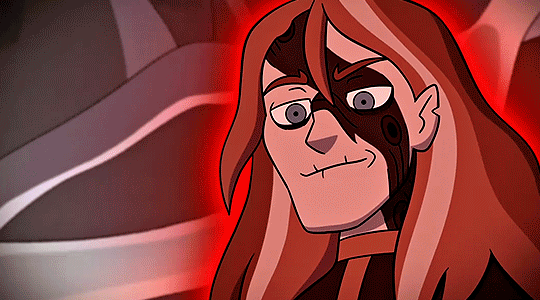
one thing i forgot to say about belos, i don't really buy the whole "belos is supposed to play on the idea of a villain about to become sympathetic, but then he isn't!" angle as a response to criticism.
for one thing, there's a lot of people talking past each other here. it seems like whenever someone critiques how he's played, there's this underlying assumption that the people critiquing it MUST want him to be a sad woobie. i don't need that, i just want him to be more compelling. so please respond to what people are actually saying.
secondly, i just don't think that's a reasonable argument in a show where every other moral is the most obvious shit you've ever heard. don't lie, be nice, found family good, propaganda and authoritorianism bad (but not bad as in a compelling story that has deep or complex themes, just bad as in "evil power hungry meanies are bad.")... but i'm supposed to believe that despite being played totally straight, he's actually a subtle and nuanced commentary on setup and payoff and how you've grown to "expect" someone like him to be deep or redeemable? please.
thirdly, and perhaps most important to me personally... its a boring reason for your villain to be written like he is. you have to be Extremely Online to think too much redemption is a real "problem" in animation. if you ask a normie to define "kids cartoons morals" they would say it has simple morals, the good guys win while the bad guys are killed or defeated. i swear some of y'all are just angry that steven universe dared to exist in a sea of more typical storytelling where the main villain is rarely ever redeemed.
if you look at the broader history of the medium as a whole, you can probably find more of the specific villain death where someone falls from a high place than ANY scenario where a big bad is redeemed.
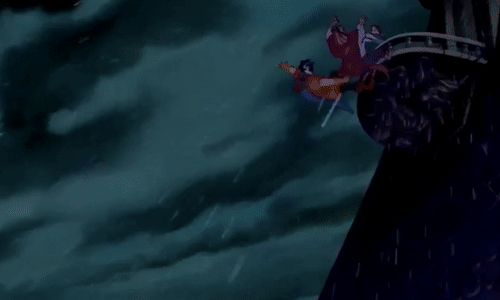
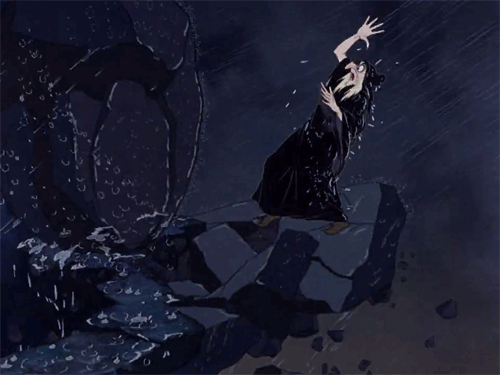
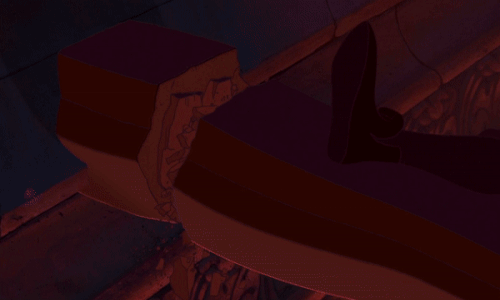
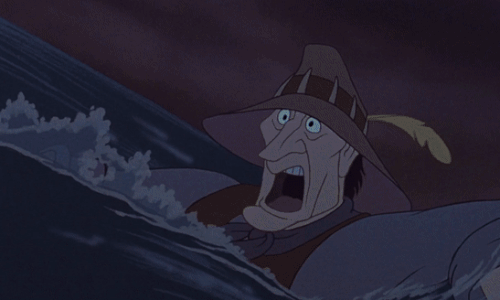
i could go on. these are just the first gifs i could find. (picture description: gaston, the evil queen from snow white, frollo and mcleach from rescuers down under all falling to their deaths.)
there's just this extreme paranoia in cartoon fandom spaces lately that - i genuinely think just because steven universe and undertale came out around the same time - we're somehow never gonna get a real villain who isn't redeemed again.
meanwhile, the reality is like. not that at all.
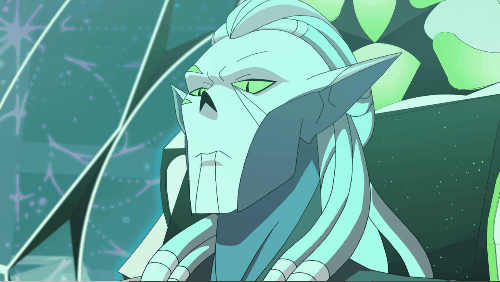
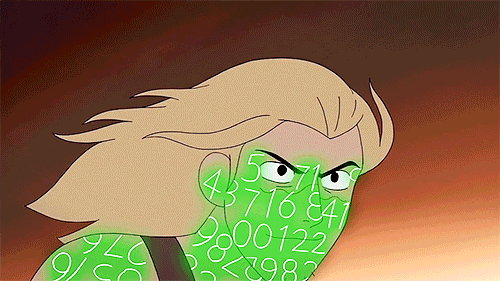
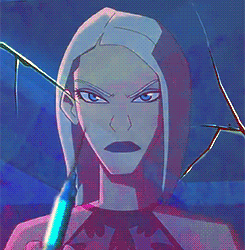
(picture description: horde prime from she-ra and the princesses of power, simon from infinity train, and emilia from kipo and the age of wonderbeasts).
so if your villain only exists to say "wow there's no evil villains who don't get redeemed anymore, i'm gonna make one just to be meta-commentary on how there's no evil villains anymore." all i can say is like... cry more? and watch something other than steven universe, i guess? because redeeming your big bads is the rare exception, not the norm. yet its somehow completely dominated Cartoon Discourse (tm) as if its redefined the rules of the whole medium.
(just to get our terminology straight - by "big bad" i mean the main villains, the primary antagonists, the people in control who are the reason bad plot things happen. they are rarely redeemed. sure, you get more redemption out of sad abused woobie lackeys... but if you take issue with THAT, you might have less sympathy for abuse victims than you think. like. geez. most of the time they aren't even villains so much as trapped in their circumstances. just be born good, i guess. most media has a true evil big bad even if the abused lackey is redeemable anyway.)
and as someone likes redemption, and is therefore a privileged neoliberal hack who has never experienced abuse or trauma myself, according to my haters, i think thats just... a bit sad. we couldn't have One (1) cartoon redeem its supposed big bads without 3+ years of hysterical crying and posturing from every reactionary fuckhead in cartoon spaces that thats it, SU exists, so from now on its Brave and Revolutionary to have an evil villain.
give me a fucking break. get over yourselves. and if thats the intention behind creating belos (which i don't think, so i'm not here for your analysis of why he really exists, but if), then i extend that invitation to the owl house writers as well.
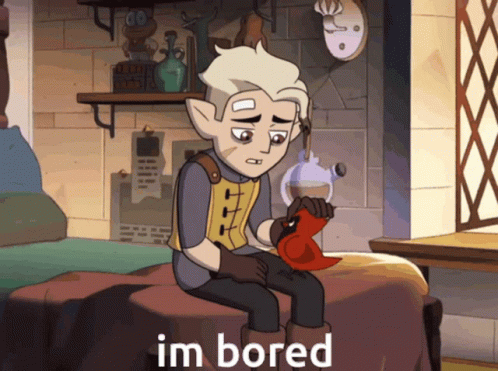
#the owl house#ask to tag /#gif /#steven universe#disney#animation#cartoons#spop#infinity train#kipo and the age of wonderbeasts#trope talk
193 notes
·
View notes
Text
So on Twitter especially, there's been a lot of "The Owl House has better queer representation than x," or "x's representation sucks" and here's why that really bothers me in a full essay on tumblr dot com.
Quick disclaimer: This is about queer representation specifically. A lot of popular queer shows have a lot of other issues with different types of representation, or lack thereof, and that can and should be criticized, and many of them include stereotypes or harmful tropes WITH queer rep that also can and should be criticized. This post is about painting queer representation as a black-and-white thing and calling certain shows' representation "bad" without any nuance
First off, what makes queer representation "good" is subjective. The LGBTQ+ community is an amazingly diverse community in both identities and personal taste, and queer representation in media should reflect that with a variety of different stories to choose from. One queer person might like stories where bigotry isn't a huge plot point, while another might want to see their struggles reflected on screen. One might like the show to be about being queer, while another might like a character's queerness to be a side plot at most. Additionally, there are so many different identities and experiences under the queer umbrella that it's unrealistic and impossible to expect a single show, book series, or movie to include them all, and that could very easily result in certain stories being swept under the carpet. Again, this is why a variety of queer shows to choose from is important. There could be a show with amazing, well-written queer characters and storylines, and you as a queer person might just not like it for whatever reason. That's perfectly fine and normal.
Second, I almost never see differences between studios and networks taken into account. Some networks and studios have a long history of loud and public homophobia (cough cough, Disney, cough cough) and queer representation is going to be significantly harder to include without your show paying the price. While The Owl House is facing a significantly shorter run for a variety of reasons, the decision was made towards the end of Season 1, right around the time of Grom and Wing It Like Witches, and especially considering that Disney funded Florida's Don't Say Gay bill, we can assume that queer rep was at least part of it. Considering that before TOH all we had coming from Disney TVA was the cops from Gravity Falls (correct me if I'm wrong) and after TOH got such a positive response from it's online fanbase Amphibia ended up including some queer characters in it's third and final season, we can already see the impact it had. (Which is why it's still important to watch TOH legally if you can-it shows that there's interest in both story-driven shows that skew older AND queer representation! Unfortunately, money is the only way to get through to Disney.)
At Netflix, however, it's a little bit different with a lot of shows because Netflix originals can often come from other studios (Dreamworks, See Saw Films, etc,) and Netflix is their distributor. This can make it a little hard to determine where queer rep is either coming from or being blocked by. For streaming services as a whole, there tends to be more representation, which is partially because of the major switch to streaming happening right now. I also have a feeling that the general theory is that for a kid to watch Kipo and the Age of Wonderbeasts (fantastic show btw) they'd have to either actively search up the show or at least choose it from their recommended or whatever, while if a kid turns on Cartoon Network or Disney or whatever and a show is playing then they basically just watch it, so for streaming services there's more ways for parents to regulate what their kids are actually seeing. (At least from what I've seen, queer representation is more likely to get a show for kids cancelled but is more likely to be either stereotypical or have a plot that relies on bigotry in shows for adults. And I haven't seen a lot in shows for teens, other than Arcane and Heartstopper.) But whichever way you look at it, queer representation, how hard it is to include, and the variety of stories varies from network to network.
Additionally, shows like The Owl House and Heartstopper are from 2020-2022. We as a community have come so far in the last couple decades, and it's simply not realistic to expect a show from 2012, or even a show from 2018, to be on par with a show from 2021. And the success of shows like The Owl House is largely due to the positive response to previous shows' representation. Same concept as rainbow capitalism: companies are starting to realize that there's money to be found from queer representation and that queer stories are profitable. Which, yknow, is not really the mentality that I'd like to be put into telling my communities stories, but it's better than nothing.
Especially with media for kids, even if a character or story is not the best written, the fact that it was there can be monumental. Looking back as a teenager, the scene in House of Hades where Nico is outed is not really the best or healthiest representation and is not how I would write it in 2022, but at age 8, before same sex marriage was even legalized, I could read about a queer character in an easily accessible and age-appropriate book series that I loved, and that was such a huge step in my acceptance journey. There were multiple copies of almost every Rick Riordan book in both my elementary school library and my local public library, my parents and teachers were already comfortable with me reading the book (even to this day, I'm not really supposed to read books that are visibly queer,) and it was a prominent, three-dimensional character in a series that was my whole life for years. Nico, and later Alex, were the representation I didn't even know I needed, and while today a lot of people agree that they were not the best-written queer characters, the fact that they were there changed my life.
For my brothers, shows like The Owl House and Kipo and books like Trials of Apollo are their Heros of Olympus. And even if they don't turn out to be queer themselves, they at least weren't assholes when I came out. Hell, She Ra taught them how to use they/them pronouns (one of my brothers doesn't quite get it but he has a lot of trouble with spelling and grammar bc of a learning disability and he's trying, which is what matters.) And my brothers, who are 12 and 9 years old, cannot remember a time where they couldn't go to Netflix, Disney+, or their school library and read or watch stories about characters like me. Which, guys, I can't get over how far we've come. I'm 14-16 (not revealing exact age for privacy reasons,) and I can easily remember a time where same-sex marriage was illegal in a lot of states and I had never seen any media with queer characters. And I've watched queer representation get better and better over the years, which inspired me to want to create my own stories too. And while we still have a long way to go, I'm so happy with the way things have been changing.
In short, here's a list of things to consider when comparing and contrasting queer media:
When was this piece of media made? How would this have affected the way these characters are written?
What studio, platform, network, or publishing company is this media from? What is this company's stance on the queer community? What was this company's stance when the media was created?
Has this company or author created any queer media since this particular piece? What does that representation look like?
Are the creators of this media queer themselves? (A little off topic, but always something to consider)
Is it actually queerbaiting, or were parts of this character's story cut in production?
Is this queer representation actually bad, or do I just not like it?
Is this queer media actually bad, or is it just for a different age group (if you don't like shows like She Ra or TOH because they're 'too childish'... they are actually for kids. absolutely nothing wrong with enjoying them, but if they're too childish for you then you might be ready for an adult show)
Did the crew or author face any backlash during production? (For a lot of media, this is a 5-second google search.)
Criticizing media is good and healthy and I 1000% support it, but contextualizing the specific book, movie, or show you're talking about is a necessary step that I very often see skipped.
#cody speaks#queer representation#lgbtq#queer#lesbian#gay#bisexual#trans#transgender#nonbinary#she ra#spop#toh#the owl house#heartstopper#gay shows#hoo#heroes of olympus
34 notes
·
View notes